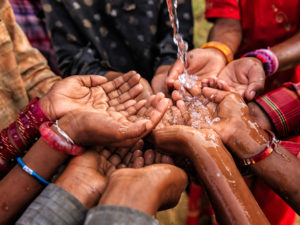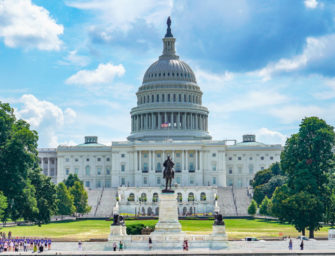Exciting Section and Focus Group News: The American Geophysical Union announces new engagement pilots, simplified naming structure, and new GeoHealth section

AGU’s new GeoHealth section will facilitate transdisciplinary research that illuminates how conditions on our changing planet affect public and ecological health issues around the globe, including access to clean drinking water in Africa. Credit: Bartosz Hadyniak/E+/Getty Images
As many of you may know, AGU has been working for the past several years to understand how our science structure could be expanded to better enable people to collaborate and connect to others with shared interests and goals. The Affiliation and Engagement Task Force investigated a wide variety of options that might better serve the needs of AGU today, and into the future, before recommending a new model to the AGU Board of Directors and the Council. This change is of critical importance because our ability to affiliate and engage has a broad impact, including on how we do our science, run our meetings, interact with nonmembers, honor achievements, and self-govern. In short, we are developing an evolving model of engagement that will allow AGU to accomplish its vision of galvanizing a community to collaborate and communicate the power of science.
Our ability to pilot engagement activities under this new model with groups seeking an improved connection with AGU, including Earth and space science educators, those working at the intersection of art and science, and more, has been incredibly exciting, and I look forward to what the future brings.
Another exciting recent change that has come from the affiliation and engagement work was the decision to begin referring to all sections and focus groups as sections. When the structure of these two groups was first created, there was a more marked difference between the way science was represented by sections and focus groups. As the science evolved and became more interdisciplinary, that difference became far more arbitrary, and simplifying the naming structure will now make membership in the groups less confusing for members and will make forming new groups easier. However, nothing is changing in the structure of the existing groups, their governance, or how they interact with their members. This is only a name change.
Finally, I’m so pleased to announce the formation of the first new AGU section since Biogeosciences was formed more than 15 years ago: the GeoHealth section. GeoHealth was established to expand and energize this critical, emerging, interdisciplinary area of science and to build productive connections among scientists and decision makers from allied disciplines, including those who are not traditionally members of AGU. The formation of this section is the result of a pilot process recently approved by the AGU Council.
Societal grand challenges require more significant research collaborations across disciplines and geographies. The GeoHealth section is one of several efforts under way at AGU to foster and facilitate the work and collaboration of researchers at the interface of the geosciences, ecology, health sciences, and other allied disciplines. The Council and the Board strongly supported the development of a cross-cutting GeoHealth program, given the growing importance of this field of study and the opportunity to bring together experts from multiple disciplines.
In addition to the new section, GeoHealth at AGU included an interdisciplinary SWIRL theme at the 2016 Fall Meeting and will include one at the 2017 Fall Meeting; the launch of a new AGU journal, GeoHealth; and the formation of meeting partnerships with other organizations, including the Planetary Health Alliance, which held its first meeting in April 2017.
The GeoHealth section will have its own sessions at the 2018 Fall Meeting. Other meetings are planned for the coming year, and the new section will help guide these. These include leading two conferences in fall 2018, one on air pollution in Xi’an, China, and a Geoscience and Society Summit, which will feature a mix of scientific presentations and workshops focused on addressing global and local challenges around sustainability and resilience.
Through these initiatives—publication of research, discussions of policy, growing partnerships with other stakeholders, and other engagement opportunities—AGU seeks to increase the influence of this transdisciplinary field. Because AGU recognizes that the community expands beyond the Earth and space sciences, we created an open GeoHealth discussion forum. I invite you, your colleagues, and your friends to join in on the conversation.
The introduction of the GeoHealth section brings this area of science to the forefront for AGU members, allowing for seats on the Council and involvement in task forces and committees, including the Fall Meeting Program Committee. This involvement in these decision-making bodies will provide further support and opportunities for researchers to address key agricultural, ecological, and health issues.
The AGU Governance Committee is currently in the process of selecting founding leaders for the GeoHealth section and working on the transition to elected leadership in the next year.
The AGU sections reflect the scientific breadth of the more than 60,000 members of our Union. GeoHealth successfully connects many of our members (Hydrology, Atmospheric Sciences, Global Environmental Change, Seismology, Natural Hazards, and others) with disciplines currently not well represented within AGU, including those working in planetary health, medical geology, and health, as well as with decision makers across the globe to focus on such topics as public health, epidemiology, toxicology, medicine, veterinary medicine, and more.
When joining AGU or renewing their 2018 membership, AGU members can now select GeoHealth as their primary or secondary section. We hope you will join the GeoHealth section and volunteer for the unique opportunity to provide input and help shape the future of the discipline.
And if you are attending Fall Meeting, there will be a gathering at AGU Central in the Exhibit Hall on Wednesday, 13 December, from 2:30 to 3:00 p.m. to discuss a variety of opportunities to get involved and to meet others interested in GeoHealth.
AGU is dedicated to meeting the challenges posed to human and environmental health head-on. Our new GeoHealth section along with AGU’s united effort to advance science will position us at the forefront of discovery and lead to much needed knowledge and solutions to our most pressing issues.



There are no comments
Add yours